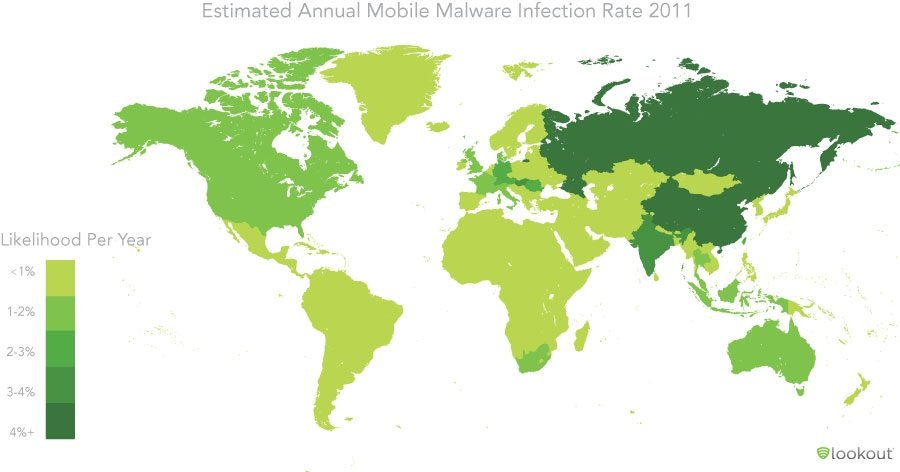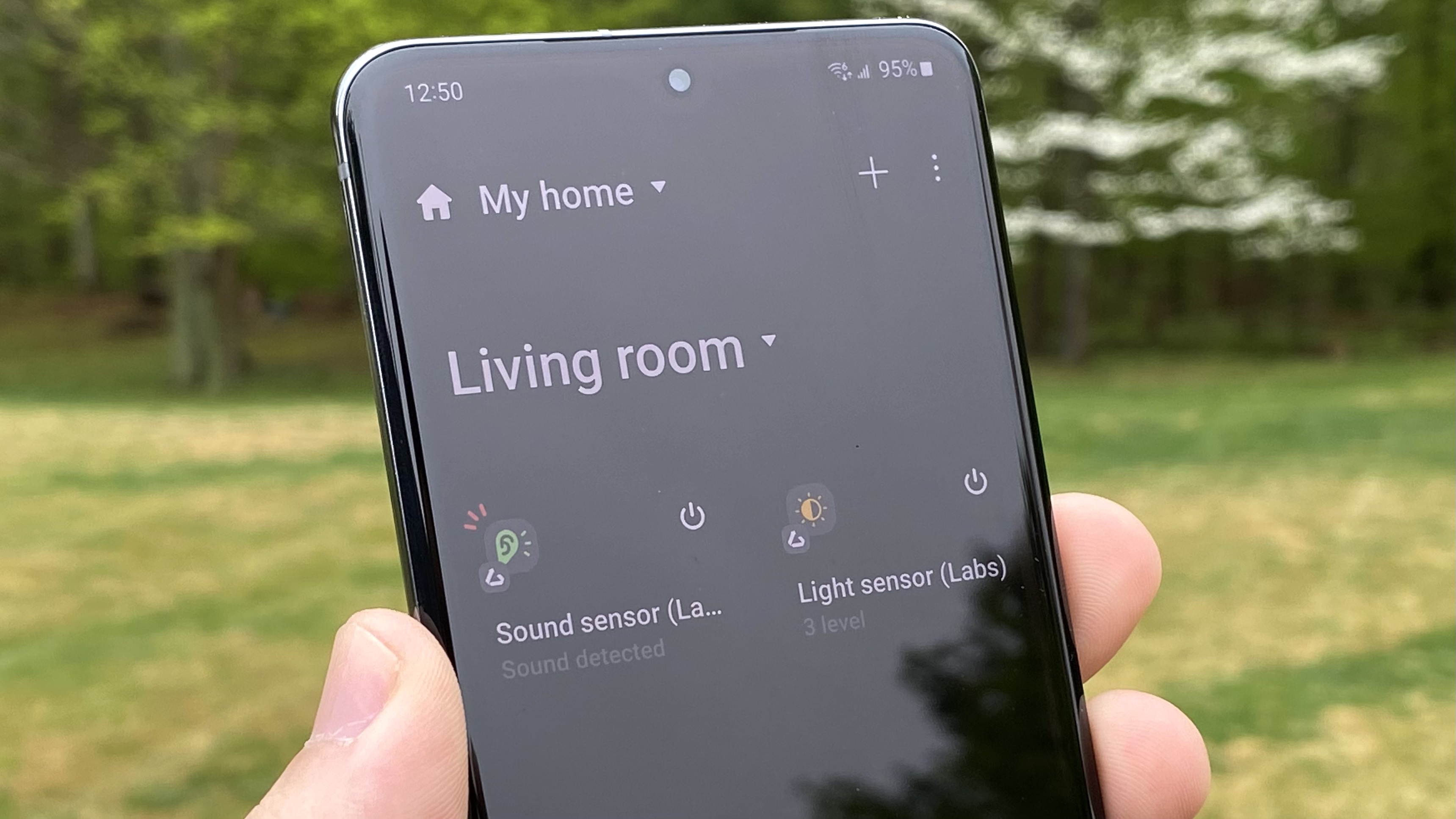Study shows that 'mobile threat activity' has risen significantly in past 6 months

Based on information collected from more than 700,000 applications installed on more than 10 million devices, the folks at Lookout have released their first Mobile Threat Report. This data shows that the threat of coming across malware has increased by as much as 250 percent in the past six months. We want to make it clear that the huge majority of Android applications, both in the official Market as well as other sources, are completely legitimate and built by honest, hard working developers -- but malware, spyware, and various nasty bits of code are out there. We've seen them out there, both real issues and overblown ones.
Now it is certainly in a company involved in mobile security's advantage to report this kind of situation, but it's always best to know exactly what we are facing out there in the wild internet. That's where Lookout's Mobile Threat Report enters the picture, explaining the different types of security issues users are likely to come up against, and information about how to protect yourself against them. Armed with this information, and a smattering of old fashioned common sense, you'll be better able to make the right decisions. Hit the break to see Lookout's press release, and visit the source link to read the Mobile Threat Report in it's entirety.
Source: Lookout
Lookout Finds Significant Increase in Mobile Threat Activity in Past Six Months
First Threat Discovered that Targets U.S.-Based Android Users to Steal Money
San Francisco —August 3, 2011—Lookout Mobile Security, the leader in mobile security, today announced the results of its Mobile Threat Report, based on threat data from its Mobile Threat Network, which includes data collected from more than 700 thousand apps and 10 million devices worldwide. Lookout found that mobile malware has increased significantly, with Android users two-and-a-half times as likely to encounter malware today than just six months ago. Lookout estimates that between a half million and one million users were affected by mobile malware in the first half of 2011. At the same time, web-based threats which operate across platforms, have emerged as a significant part of the threat landscape with three out of ten mobile users likely to click on an unsafe link, including malicious and phishing links, over the course of a year.
Get the latest news from Android Central, your trusted companion in the world of Android
New Threat Steals Money by Charging Users for Premium Rate Text Messages
GGTracker, discovered in June 2011, is the first known Android malware that specifically targets U.S.-based Android users. This malware signs users up for premium text message subscription services without their knowledge, charging $10 per service to a person’s phone bill. In some cases users were charged for multiple services with total charges ranging up to $50. Previously, these types of attacks mainly affected Android users in China, Russia and Eastern Europe. In addition to the monetary impact of the malware, GGTracker used new techniques to broadly distribute the malware including Malvertising.
Malware Developers Explore New Distribution Methods
During the first half of 2011, Lookout found that attackers repackage legitimate applications with malware, creating Trojan applications that appear to be legitimate, but in fact are malicious, and post them to app stores and download sites. More recently, malware writers are using new techniques to secure wide distribution. Attackers employ a tactic called Malvertising, whereby they use mobile ads to direct users to a malicious website that triggers an automatic download of malware. Additionally, Lookout saw the first Update Attack, in which an attacker first publishes a legitimate application with no malware, and once they have a large user base, they release an update that includes malware so the entire user base gets the updated infected application.
In the First Half of 2011 the Number of Malicious Apps Grew to 400
During the first half of 2011, the number of unique apps with malware found on markets and download sites grew from 80 to 400 apps. Two of the most prevalent threats, DroidDream and GGTracker, were regularly published in new apps over the first half of the year. During this period, the authors of DroidDream released more than 80 unique applications with variations of malware to take control of a user’s phone. Similar to DroidDream, the authors of GGTracker continue to publish new infected apps across app stores and download sites, bringing its total infected app count up to 15 since mid-June.
How to Stay Safe
“As mobile devices grow in popularity, so do the incentives for attackers,” says Kevin Mahaffey, CTO and co-founder of Lookout Mobile Security. “We’ve seen the prevalence and the level of sophistication of mobile malware attacks evolve significantly in the first six months of 2011. We expect this trend to continue as more and more people adopt mobile devices.”
As the frequency of mobile threats increase, people can take measures to stay safe:
· Only download apps from trusted sources, such as reputable app stores and download sites. Remember to look at the developer name, reviews, and star ratings.
· After clicking on a web link, pay close attention to the address to make sure it matches the website it claimed to be.
· Download a mobile security tool that scans every app you download for malware and spyware, and can help you locate a lost or stolen device. For extra protection, make sure your security app can also protect from unsafe websites.
· Be alert for unusual behavior on a phone. This behavior could be a sign that the phone is infected. These behaviors may include unusual text messages, strange charges to the phone bill, and suddenly decreased battery life.
About Lookout Mobile Security
Lookout is a mobile security company dedicated to making the mobile experience safe for everyone. Lookout delivers award-winning protection from the growing threats facing mobile users today including malware and spyware, phishing scams, data loss, and device loss. Lookout is cross-platform, cloud-connected and designed from the ground up to provide advanced protection for smartphones while remaining lightweight and efficient on the phone. With users across 400 mobile networks in 170 countries, Lookout is a world leader in smartphone security. Headquartered in San Francisco, Lookout is funded by Accel Partners, Index Ventures, Khosla Ventures and Trilogy Equity Partners. For more information and to download the application, please visit www.mylookout.com.

Jerry is an amateur woodworker and struggling shade tree mechanic. There's nothing he can't take apart, but many things he can't reassemble. You'll find him writing and speaking his loud opinion on Android Central and occasionally on Threads.
